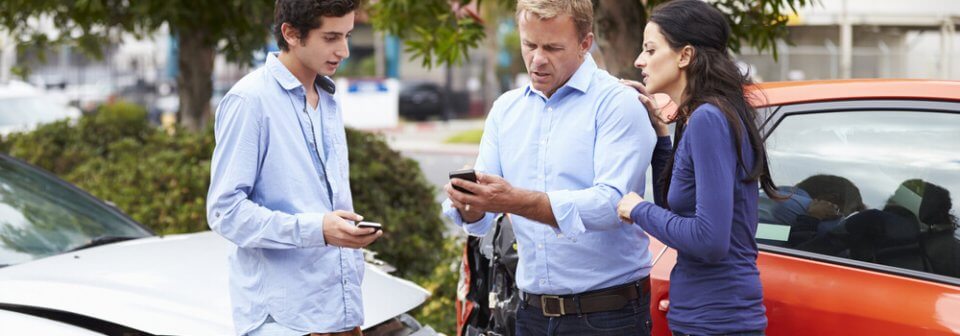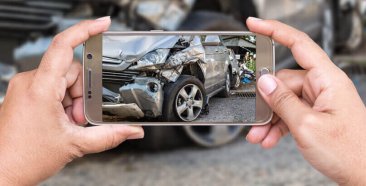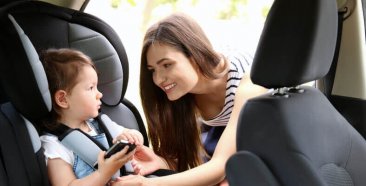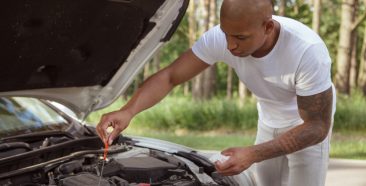
“Accidents happen” is just a truth of life. Whether it is a car crash, motorcycle accident, or a minor fender bender, most people will file an insurance claim for an auto related accident once every 17.9 years. Given that even the most responsible driver could be involved in a car accident, it is important to know what to do in case you’re involved in a collision.
Getting into a car wreck can be jarring, stressful, and cause panic, but if you follow these steps you’ll be better prepared. You will feel better knowing what to do and stay cool under the pressure. Here’s what to do in a car accident in order to protect yourself, stay calm, and ensure that your insurance claim process goes smoothly.
Be Prepared
No one intends on being in traffic accidents, but it’s a good idea to be prepared ahead of time in case you end up being in one. Have a set of orange safety cones, emergency flares, or warning triangles in your trunk so that you can use them to alert and divert oncoming traffic from the scene of the accident. You should also carry a pad of paper and a pen so it’s easier to jot down contact information so you can take both photo records and hand-written records of what you need. Pack a first aid kit and bottled water to help mend minor injuries and stay hydrated until help arrives.
It might also help to have a front and rear dash camera installed so that you have video evidence to turn over to the police department or insurance companies. Having this is especially helpful if you believe the accident was staged or the other driver acted recklessly but still make you seem like the at-fault driver because of the nature of the crash. .
Have your insurance policy information, health plan info (i.e., insurance card), vehicle registration, ID, and other documentation on your person and at the ready in case they need to be verified onsite. Having these small things prepared and on hand can make a big difference in case you wind up in a car, motorcycle, or truck accident where you will have to exchange information with another party.
Check On Everyone Involved in the Accident
The most important thing to determine in any car accident is the well-being of everyone involved. Check yourself and the people in your vehicle first to make sure that nobody has sustained any life-threatening or serious injuries. Once you’ve completed this check, move onto the other vehicle(s) involved. This includes the drivers, passengers, and pedestrians affected.
Even in the case of minor accidents, calling the police is required depending on the state you’re in–even when the driver is cooperative and not irate. Many insurance companies will ask for an official police report in order to proceed with the claim.
Regardless of fault, it is important to make sure no one has any obvious injuries and is in need of emergency medical attention. If someone is hurt or even feels dizzy, call 911 for emergency medical services to arrive and administer professional treatment.
Move to a Safer Area
If your car is still able to move after your auto accident, try to move to a safe place such as a side street or shoulder. If this isn’t possible, flip on your hazard lights and use your road flares/cones/triangles to let the surrounding area know that you are unable to move your vehicle. This will also help protect the scene of the accident. Under no circumstances should you flee the scene of a crash, even if you are not at fault.
Call the Police
Even in minor traffic accidents, an accident report filed by the local police can help your auto policy provider verify your insurance claim. Cooperate fully with the police when they arrive, but do not make any statements admitting fault or blaming others for the accident. It is the job of the law enforcement officer to judge who, if anyone, is to blame for the traffic incident. If there are no injuries and the police are unable to make it to the scene, car accident reports can be filed by you and the others involved in the accident at your local DMV.
Gather All the Information You Can
The more accurate information you gather, the more smooth your claims process will be. When you’re in an accident, make sure you obtain:
- The driver’s name, as well as the names of any passengers and pedestrians involved in the accident. If your accident has caused property damage, you’ll want to get the names of property owners, too.
- The driver’s license number of the other driver(s) involved.
- License plate numbers of all the vehicles involved.
- The makes and models of all the vehicles involved.
- Telephone numbers from any eye witnesses.
- The address and location of the accident.
- The names and badge numbers of the police officers that responded.
- The insurance information of everyone involved in the collision.
- If you have a cell phone or a camera, take photos of the accident and the damage it caused to help verify the incident with your insurance provider.
Contact Your Insurance Provider to File an Insurance Claim
Once you have ensured that everyone is safe or being treated with medical care, the police have been contacted, and you have had a chance to gather information, call your insurance provider as soon as possible to report your car, truck, or motorcycle accident. The faster you file a claim, the quicker your insurance company will be able to act on it. At this point, your insurance company will confer with the investigating officer and other parties involved using the information you have provided to help confirm and process your claim.
General Tips on What to Do After A Car Accident
Do not sign any document or contract unless it is an official report provided by the police or your insurance agent. Be polite and helpful to everyone involved in the accident, but do not tell or hint to anyone that the accident was your fault, even if you believe it was (and even if it was a minor accident).
Limit your discussion of the accident to only the police and your car insurance company, just discuss the facts without assigning fault or blame to anyone, including yourself.
If possible, don’t leave the site of the accident until before the police and other drivers do.
Having proper auto insurance coverage can ease your mind if you get involved in a car accident.
How Do Insurance Companies Pay Following a Claim?
This will greatly depend on who is at fault and the types of coverage the drivers’ involved carry. If you are not at fault, the other driver will pay for the damage of your car up till their liability limits. If you or others in your vehicle sustained injuries in the accident and need to seek medical treatment, their insurance will cover your medical bills up till their bodily injury liability coverages.
If the motor vehicle accident was your fault, you and your own insurance company are going to be responsible for compensation. You’ll be responsible for the damages to the other vehicle and your own, as well as medical expenses for any sustained injuries. Be sure to be aware of the laws in your state when it comes to accidents. Some states, such as Florida, require all drivers to carry PIP. You should be aware of what the state law is where you live.
Optional Coverages That Can Help at the Accident Scene
If you use AAA or emergency roadside assistance, this can help get your vehicle on a tow truck quickly. Also, while you don’t worry about it during the binding process, having rental car reimbursement ensures that you can still get to work and around town while your vehicle is in the shop.
Get a free car insurance quote for affordable, quality car insurance through Freeway Insurance or call (800) 777-5620 to speak with a live agent.


